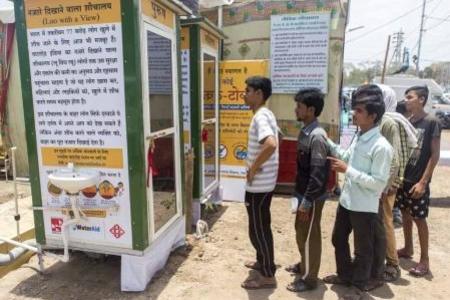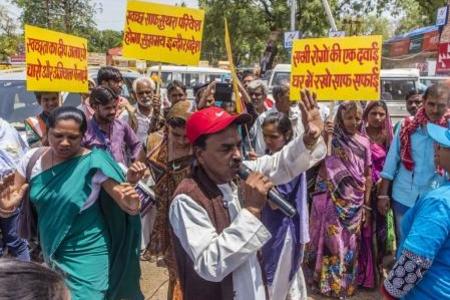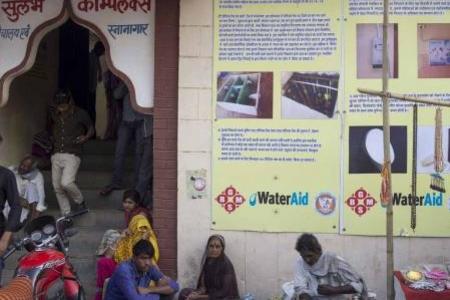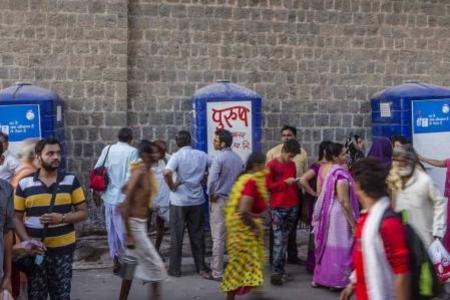WaterAid India at Simhastha Kumbh 2016

This Women’s Day, WaterAid unveils what mothers-to-be like to take to hospitals in their maternity bags.
Depending on where in the world they are giving birth, the items women choose to take to the hospital might be life-savers, or simple luxuries. WaterAid photographed and interviewed women internationally – from the UK, the US and Australia, to India, Malawi, Zambia and Madagascar.
It was interesting to notice the stark contrasts between maternity bags ranging from life-saving necessities like sterile razor blades, soap, boiled water and torches to stress-relieving luxuries like iPads and massage oils. The project highlighted that different choices made by women shockingly depends on whether they can rely on there being clean water, sanitation and hygiene (WASH) when they give birth to their baby.
Meet Pushpalatha Sahoo, 34 years, who lives in a slum near Puri in the state of Odisha and is in the eighth month of her pregnancy.
What women carried in their maternity bags differed depending on whether they are delivering the child in a rural or urban setup, in a private or public healthcare facility, and largely on the financial condition of the family.
Pushpalatha has packed bottles in her maternity bag. “I need to carry boiled water with myself when I go for my delivery as there is no safe water at the health centre. Also, the toilets are not good for pregnant women as I find it difficult to squat in a narrow toilet and there is not enough water also.” Other items in her maternity bag include one towel, five food vessels, one glass, one spoon, two sarees, one soap, one blanket, and one cloth. WaterAid/Anil Cherukupalli
Agnes is 22, and is in the Kiomboi Hospital at Iramba District in Tanzania. This baby will be her third child.
In her maternity bag she has clothes for the baby, blanket, socks, a basin, a flask and tea. Better access to water, sanitation and hygiene in healthcare facilities is crucial for mothers and babies to stay healthy.
Sepsis, meningitis and tetanus are all infections linked to unhygienic environments and kills thousands of newborn babies annually. With no safe water at the clinic where she’ll be giving birth in Monze district of Zambia, mom-to-be Hazel has packed a basin to wash with.
She has packed black plastic to lay on during her delivery, to try and reduce the risk from unclean sheets.
Other items in Hazel’s maternity bag, include a baby blanket, cotton wool, a sarong, a baby suit, a basin to wash with and a roll of black plastic.
In Melbourne, Australia Katy has stuck closely to the list of items the hospital recommends for giving birth, including toiletries, snacks and massage oils to help her relax.
“The hospital has kept me very well informed and I feel I’m in a good position in terms of knowing what to expect,” she says.
Katy’s maternity bag contains toiletries, snacks, hats, socks, mittens, baby clothes and swaddles, night dresses, maternity underwear, maternity pads, nursing pads and massage oils.
In the UK, there are two important items in Joanna’s maternity bag: her medical notes and the blanket her mum gave her, to bring her new baby home in.
“My sister suggested bringing something to make it easier to drink water during the labour, so I have packed a water bottle. I will bring it empty — I’m assuming the hospital will have somewhere I can fill it,”she says.
Joanna’s maternity bag contains nappies, baby clothes, knitted trousers, snacks, a towel, clean clothes, toiletries, a TENS machine to help with pain, maternity pads, an iPad, a water bottle, medical notes and a blanket.
“We selected a hospital which has all facilities like clean and hygienic toilets and safe water so that we could ensure a safe birth for our child. I never thought about it before but not having safe water or a private toilet when I’ll be at the hospital for giving birth is unimaginable for me,” says Swarnali Gogoi, from Noida, Uttar Pradesh. WaterAid/Anil Cherukupalli
India is one of the most populous countries in the world, with 327 million women of childbearing age, and 26 million children born every year. WaterAid believes in giving mothers, their newborns and their families a brighter start and a better future: simply through clean, safe water, proper toilets and better hygiene. WaterAid/Anil Cherukupalli
Swarnali’s maternity bags has diapers and toiletries, socks and blankets for her new born, maxi pads for herself and a baby receiving blanket. She had not even thought about packing water as she was confident that the private hospital she had selected would have all the necessary WASH facilities. WaterAid/Anil Cherukupalli
Check out our press release on how water, sanitation and hygiene affect what mothers-to-be pack in their maternity bags.



















